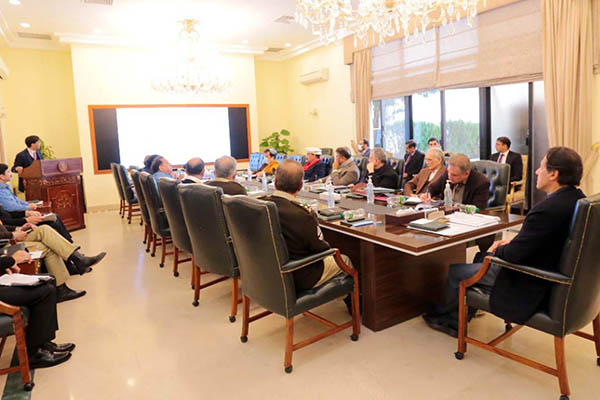
The 36th meeting of the National Security Committee. Photo courtesy PID
Hailing ‘historic’ moment, P.M. Khan emphasizes that national security is intrinsically linked to security of Pakistani citizens
The National Security Committee (NSC) on Monday approved a draft National Security Policy that centralizes economic stability at its core while ensuring the safety, security and dignity of all citizens of Pakistan.
Chaired by Prime Minister Imran Khan, the 36th meeting of the NSC approved the National Security Policy 2022-2026, the first such document in the country’s history. The policy would now be presented to the federal cabinet for further approvals before being official adopted. According to a statement issued by the Prime Minister’s Office, the policy would be made public at a later time.
National Security Adviser Moeed Yusuf presented the policy to the NSC for approval and briefed the meeting on its salient features. He stressed that Pakistan was shifting toward a “comprehensive national security framework” that would ensure a citizen-centric approach to security, with an emphasis on economic security. “A stronger economy would create additional resources that would in turn be judiciously distributed to further bolster military and human security,” read the statement.
It said that the NSC was informed that the National Security Policy had been created through collaboration between all relevant sectors of the government over the past 7 years and had included consultations with federal government institutions, all provinces, and the academia and private sector. “It was highlighted that a detailed implementation framework had been created through which the National Security Division would review progress in collaboration with relevant ministries and departments,” the statement added.
Addressing the meeting, the prime minister stressed that the security of Pakistan was intrinsically linked to the security of its citizens. He voiced confidence that Pakistan was well prepared to meet any internal and external threats. Terming the formulation and approval of the National Security Policy a “historic” moment, he emphasized that it must guide all organs of the government to ensure that all efforts were synchronized with the overall direction outlined by the policy. He also instructed the NSA to present an implementation progress report to the NSC on a monthly basis.
Approving the policy, NSC members appreciated the National Security Division and all other government departments for their work. They also unanimously approved the revitalization of the Planning Committee and the expansion of NSC’s Advisory Board.
The five-year National Security Policy is intended to guide the government’s foreign, defense and economic policies and decision-making. It covers both traditional and non-traditional security challenges, including economy, food, water, military security, terrorism, population growth and dealings with the external world, especially major powers, as well as concerns regarding the Kashmir dispute and the situation in Afghanistan.
The document emphasizes economic diplomacy as the focus of Pakistan’s foreign policy in line with P.M. Khan’s stated aim of repositioning the country along “geo-economic” lines. Earlier, NSA Yusuf had said it was intended to be a dynamic document that would be reviewed and revised annually, including upon the transition of government to ensure continuity in policies.
In addition to the prime minister and the NSA, the meeting was attended by the federal ministers for foreign affairs, defense, information and broadcasting, interior, finance and human rights, as well as the services chiefs and senior civil and military officials.
